Muslims, those of African and African-Caribbean descent and white women speaking out against racism are being targeted in a new culture war now distorting and degrading Europe’s electoral politics.
Is it possible to demand a common reflex, a unified emotional response from all the citizens of a country to the symbols or cultural traditions that epitomise the nation? Across Europe, tensions are growing around specific symbols, whether it be the St George’s flag in England or Zwarte Piet in the Netherlands. Similarly, but from a different direction, veils are part of the new culture war, with bans and restrictions on ‘covering’ cast as essential for national coherence, marking out who belongs in Europe and who does not.
Whether the white or heterosexual majorities in Europe like it or not, many members of minority communities will have a different relationship to national symbols. While minority members may well be happy to wave the Tricolour at the Olympics or sport the St George’s flag during the World Cup, walking late at night in an unfamiliar neighbourhood, their heartbeats would probably race, as would their footsteps, if they passed a house decked out in national flags. This does not suggest instinctive snobbishness, but the most basic of human instincts – survival.[1]
Just before the overhyped drama unleashed by the London Islington MP Emily Thornberry’s tweet of a photo of a house in Rochester just so decked out, and the Sun’s championing of Dan Ware, its ‘white van man’ owner, another battle was raging across the North Sea, within the Dutch Labour Party. While Labour leader Ed Miliband was telling the nation of the respectful feelings the English flag evokes within him, and a humiliated Thornberry was compelled to tender her resignation from the shadow cabinet, two Dutch MPs, Tunahan Kuzu and Selçuk Öztürk, both of Turkish origin, were expelled from the Dutch Labour Party (PvdA) after refusing to sign a statement supporting the integration strategy of deputy prime minister Lodewijk Frans Asscher. (The PvdA is part of the governing coalition, which is led by the conservative-liberal VVA.) On 13 November, an emergency meeting of the PvdA was called and the two MPs, after refusing to sign a document of allegiance to the party’s deputy prime minister, were thrown out. They now sit as independents.

Witch hunt – Dutch Labour-style
The Netherlands has become more and more insensitive to the pressures on and vulnerabilities of minorities, partly because of the extreme views popularised by a series of ultra-right neoliberals, from Pim Fortuyn to Hirsi Ali and Geert Wilders. Wilders, never one to understate his patriotism, and ever-willing to offer himself up for martyrdom, recently vowed that, if necessary, he would march alone, carrying the Dutch flag through the poor, largely Muslim neighbourhood of Schilderswijk, if its local council in the Hague went through with its plan to ban a second protest by the (snappily-named) ‘Freedom March Against Muslim Radicals and the Islamic State Terror Group’. (Watch a video showing the activities of the Dutch Defence League during the march, here.)
The Dutch Labour Party, for its part, has marched straight into Wilders’ territory. In the autumn, amidst fears, fuelled by a poorly designed and academically-slated research study (a poll of 400 youngsters stopped outside mosques and shopping malls and questioned about their attitude to jihad), and a frenzied media debate about conservative attitudes in the Dutch-Turkish community towards gay fostering and adoption, the Ministry of Social Affairs commissioned research into four Dutch-Turkish Sunni organisations (Milli Görus, Süleymanlis, Diyanet and the Hizmat movement) to ascertain whether they adhered to Dutch values.[2] In fact, the research, when finally published, took a rather nuanced approach to the question of these groups’ engagement in Dutch society. Nevertheless, its conclusion that, as long as the four groups continued to work within Dutch legal frameworks, their constitutional right to freedom of religion and organisation was guaranteed, was ignored by Dutch deputy prime minister, Lodewijk Frans Asscher. He wrote to parliament asking that the organisations be placed under surveillance and recommending that all state subsidies be ended. When MPs Kuzu and Özturk refused to endorse this, they were issued with their marching orders. The two clearly embittered MPs accused Asscher of advancing not ‘integration’ but ‘exclusion’, adding that Dutch-Turks are now treated as ‘second-class citizens’ and that millions of people are now no longer represented in the Dutch parliament. ‘We will work to bring a new voice into the harsh integration policy that has become more racist … and right wing over the past ten years and we will express this in Parliament until our last breath’, the two MPs stated.[3]
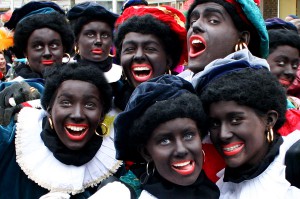
For the Labour deputy prime minister, the dispute was all about ensuring that Muslims, and those who are seen to represent them in parliament, adhere to one set of Dutch norms and values. He used this phrase, seemingly unaware that the Netherlands is currently being torn apart by a dispute generated by a powerful symbol of Dutch norms and values, namely the blackamoor character of Zwarte Piet (Black Pete). (Read Chandra Frank and Serginho Roosblad’s article, ‘“Zwarte Piet” and Dutch racism’.) According to Dutch tradition, each November, Santa Claus accompanied by his little Zwarte Piet’s blacked-up helpers (replete with bright red lipstick, golden earrings, colourful minstrel-like garb and frizzy afro wigs), travel by steamboat from Spain to a Dutch port town where thousands of children line the waterfront in a welcome that is both theatrical spectacle and national folklore. But such is the tension aroused by the Sinterklaas festivities that, this year, a private bodyguard of riot police had to accompany Santa Claus and his blacked-up helpers as they arrived in Gouda. (Watch a short film by Sunny Bergman on Londoners’ anger at Zwarte Piet and the tradition of blacking up). Those demonstrating against what they believe is an out-of-date racist spectacle, with roots in Dutch participation in the Atlantic Slave Trade, found themselves subjected to hysterical abuse by rightwing thugs, and at least sixty anti-racists were arrested and fined for protesting in the wrong place, with a further thirty people arrested for breaching the peace.[4]
Black and Muslim parliamentarians hounded
Dutch anti-racist activists and Kuzu and Östurk are not alone in being penalised. Black and Muslim MPs throughout Europe are facing ‘patriotic tests’, based solely on skin colour or perceived religious affiliation. And female MPs, in particular, are being singled out for accusations that they are either disloyal or unfit for the post, even by their fellow (white male and female) parliamentary colleagues, with sexual slurs thrown in for good measure. Sometimes, as in the case of Italy’s first black cabinet minister, Cécile Kyenge, it is skin colour that singles out these women as traitors to traditions and norms, with MPs from the Northern League (NL) accusing Kyenge of seeking to ‘impose her tribal traditions’ on Italy, and one white female NL politician (subsequently expelled) asking on Facebook: ‘Won’t someone rape her, just to make her understand what victims of this terrible crime feel’.[5] With fascists issuing death threats and nooses appearing on lamp posts in towns that Kyenge visited as part of her official duties, the Northern League decided to run a regular feature in its newspaper, La Padania, helpfully listing her daily programme and exact whereabouts.

Suffering such abuse from parliamentary colleagues continues elsewhere. In September, during a highly-charged TV discussion called The Debate, where Muslim politicians and representatives from mosques were subjected to repeated questioning about their adherence to Norwegian values, Hadia Tajik MP (the first Muslim ever to hold a ministerial post in Norway), revealed the serial harassment she had faced over a number of years from populist anti-immigration Progress Party MPs and supporters. Tajik, a lawyer of Pakistani-origin, was once the country’s Culture Minister. She currently chairs the parliamentary justice committee, something that Progress Party MP Ulf Leirstein finds highly problematic on account of her ‘Muslim background’, and accusing Tajik of secretly supporting the beheadings carried out by the barbarians of the Islamic State of Iraq and Syria (Isis).[6]
In France, Socialist ministers, Najat Vallaud-Belkacem (the first woman education minister) and justice minister Christiane Taubira have been subjected to racial slurs and loyalty discourses by the Front National and magazines associated with extreme-right or neoconservative ideas, such as Minute[7] and Modern Values (Valeurs Actuelles).[8]
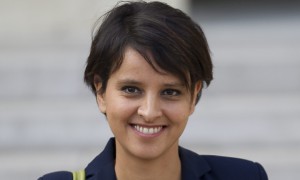
The attack on Christiane Taubira is rooted in the hysteria generated by the ultra-right umbrella organisation French Spring (Printemps Français) against the introduction of a law to legalise same-sex marriage. As the legislation went through parliament in the first six months of 2013, this alliance of Catholic fundamentalists and far-right organisations organised demonstration after demonstration, culminating in 150,000 people taking to the streets of Paris in the largest ultra-right demonstration in France for thirty years. Passions were high in parliament too, with one Senator claiming that the legislation would pave the way for people to marry animals or objects, while another claimed that the government was ‘killing children’ by allowing same-sex married couples to adopt.[9] Dominique Venner, a veteran far-right historian blogged about the ‘vile law’, days before he shot himself dead on the altar of Notre Dame Cathedral in an act which FN leader Marine Le Pen eulogised as an ’eminently political’ gesture.[10]
Many MPs who supported the legislation received death threats, but it was the black justice minister Christiane Taubira who bore the brunt. She was singled out for attack and compared to a black monkey on Facebook, with the Minute magazine carrying a front cover image of her with the headline ‘Crafty as a monkey’ and ‘Taubira gets her banana back’. (The editor was later fined for the racist provocation.) The headline was a reference to incidents where parents brought their children to protest against Taubira, encouraging them to wave a banana in her face while chanting ‘ La guenon, mange ta banane’. (‘Ugly ape, eat your banana!’)
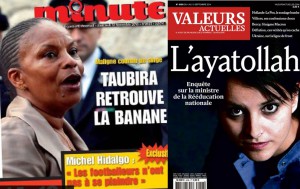
Two rightwing magazines also reacted negatively to Moroccan-born Vallaud-Belkacem’s appointment as education minister with the headline ‘A Moroccan Muslim heads the national education ministry’. (Vallaud-Belkacem describes herself as a non-practising Muslim). Minute described her appointment as ‘the Najat Vallaud-Belkacem provocation’. Modern Values, for its part, launched an inquiry into the ‘minister for re-education’, with a picture of the Minister captioned, ‘The Ayatollah’.[11]
Unleashing ‘angry white men'[12]
These ugly attacks on female government ministers are clearly not just linked to racialised loyalty discourses, but also to another ‘culture war’, generated by reactionary patriarchal values, fear of female power and autonomy, as well as the challenges posed to the traditional (heterosexual and patriarchal) family. It’s not far-fetched to point out that behind such cases (and others like the attack on the classics scholar Mary Beard after she dared to defend immigration on BBC’s Question Time programme) lies an aggressive male chauvinism to successful women who should be ‘slapped down’ if they get ideas above their station. Black women who advance to powerful positions previously reserved for white men are particularly threatening. Austerity clearly enhances insecurity which appears to be unleashing a new wave of angry misogyny. In the cases we point out below, white women, like Mary Beard, are also being subjected to virulent abuse if they speak out against racism, perceived as a treachery against their race.
But at least elected parliamentarians, unlike the rest of us, receive institutional protection when their physical safety is threatened. The Islamophobia generated by the war on terror has created enemy images of veiled women, and constant images of war on TV and in the media which has, it appears, provoked a desire amongst some white men to sexually humiliate Muslim women. The Collective Against Islamophobia (CCIF) in France says that once it used to consider insults against Muslim women the most likely form of Islamophobia-inspired aggression. But current attacks are becoming more violent with attempts to rip off women’s veils and tearing of other items of clothing, and even sexually-explicit touching. ‘These are signs of male domination’, concluded CCIF spokesperson Elsa Ray, who said that young women aged 13-20 and mothers accompanied by their children are the most at risk to this kind of racist and sexist violence.[13]
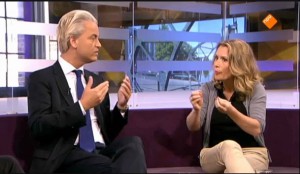
The reactionary ideas about a woman’s place held by Farage and UKIP politicians are by now well-known, as are the even more bizarre views of Ukip’s new partners in the European parliament, Poland’s Congress of the New Right. Its leader, Janusz Korwin-Mikke, has a strong belief that ‘European male aggression’ has a positive value (‘Give them a pistol, give them a sword’, he told an Observer journalist). He also told Emma Graham-Harrison that women’s opinions are shaped by the men they sleep with, and that nearly half of women who tell a man they don’t want to have sex with them are feigning reluctance and should be ignored.[14] Parliamentary debates have recently provided opportunities to repackage ideas on female fertility associated with discredited eugenics under the cloak of a legitimate fear of alien religions. During a Dutch parliamentary debate on integration, PVV MP Machiel de Graaf declared that unless something was done the majority of children in Dutch schools would be Muslim adding that ‘Dutch unity, identity and culture are being wrecked by immigration and via wombs’.[15] Already, in May 2014, a (white) Dutch actress, Elle van Rijn received death threats after she challenged Geert Wilders on a talk show over his use of statistics to claim people did not like Moroccans. One threat van Rijn received stated ‘Dirty leftist whore, you’ll find out. I often see you walk around with that ***** head of yours. Soon a knife between your tits, dirty breeding machine.’[16]
If 9/11 encouraged a cult of European ‘defensive’ male aggression, so welcome to those like Janusz Korwin-Mikke, the rapid military successes of Isis has breathed new life into various ultra-patriot, counter-jihadi and White Supremacist groups whose stock-in-trade is provocative marches through Muslim neighbourhoods.
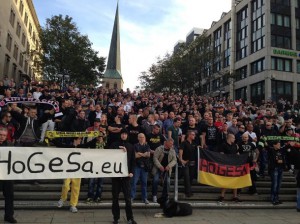
In Germany, where five mosques were attacked in August, football fans in the cities of Essen, Nuremberg, Mannheim, Frankfurt and Dortmund joined forces with neo-Nazis in a ‘temporary fighting alliance’, Hooligans gegen Salafisten (‘Hooligans against Salafists’, Ho.Ge.Sa.). The new alliances fighting tactics culminated in a violent rampage through the streets of Cologne, where marginal Salafist groups have been active, on 26 October 2014. Declaring themselves on Facebook as the ‘resistance’ movement against ‘the true enemies of our shared homeland’, Ho.Ge.Sa has an estimated 16,000 supporters and a core group of 300 fighters. (Watch a video of Ho.Ge.Sa. marching through Cologne here.)
Isis-related ‘loyalty discourses’
Meanwhile, the rapid rise of Isis and its military successes in Iraq and Syria has once again prompted an obsession with Muslim communities’ loyalties, and the accusatory question ‘Where Does Your Loyalty Lie?’ (Read Ryan Erfani-Ghettani’s article, ‘Islamophobia, loyalty and the treason debate’.) Across Europe, anti-terrorist laws are being hastily drawn up to deal with European citizens believed to have joined militias in Syria.
Ever since 9/11, anti-terrorist laws and associated administrative measures aimed at veils, mosques and minarets, have drawn on a discourse about loyalty and patriotism already prevalent in sections of the media when reporting on ‘integration’. Held collectively accountable for atrocities abroad, Muslim communities’ loyalty and allegiance to Europe is constantly in doubt. As we have seen, even elected parliamentarians, like the Norwegian MP Hadia Tajik, are subjected to such accusatory processes, accused of the Muslim trait of dissimulation, citing taqiyya (an Islamic term).
Laws made in haste in response to hysteria about a particular crisis and lacking a universal application, seldom make good laws. When the civil war erupted in Syria, western governments initially supported the rebels (thereby legitimising their right to take up arms), only to change their minds as Isis emerged as the dominant force, taking over huge swathes of Iraq and Syria, drawing in rebels from other factions, demoralised by defeat and magnetised by Isis’s seemingly unstoppable successes.
The media terms ‘jihadi tourists’ and the ‘foreign fighters’ are misleading in that the fighters who have left Europe to join the militias are not foreign (in European terms), but British, Belgian, French, Spanish, Swedish, etc and, increasingly, many of them are children. But by redrawing the enemy in this way, the debate closes down on any domestic solution to the problem beyond criminalisation and then justifies measures and laws that treat Muslim communities per se as ‘the enemy within’ or an ‘Islamist fifth column’, overlooking the fact that some may be children in need of protection.
Stripped of citizenship rights
Austria, France, Belgium, Spain, the UK and the Netherlands are among countries introducing laws that will only deepen children and young adults’ sense that, if they are from a Muslim background, then theirs is a ‘suspect community’. On the one hand, the remarkably similar anti-terrorist provisions being introduced in all these countries, which grant the security services blanket monitoring and surveillance powers, are a threat to all citizens, something that concerns the French judges’ trades union, the Syndicat de la Magistrature in France,[17] as well as Manchester’s chief constable, who has warned of a ‘drift towards a police state’.[18]
But there is also a one-size-fits-all approach to those Muslims travelling to Syria, as well as those seeking to return. Measures include the seizure of passports, the internal relocation of young Muslims ‘suspected of harbouring jihadist sentiments’, as well as the revocation of citizenship rights of those who go to fight in Syria and will now be prevented from returning to the country of their birth. What is striking is the way that European Muslim citizens, unlike their white fascist counterparts (some of whom have likewise joined militias in the Ukraine, and fought alongside the Serbs in the Bosnian War), are treated. Under the law, European Muslims become not just second-class citizens but aliens. Previously, laws adopted by European states allowed, under certain circumstances, for the revocation of citizenship from those with dual nationality. But now European states are, in law or in effect, rendering people stateless – revoking citizenship rights from their own citizens, thereby reducing citizenship to a ‘temporary state’ removable at will.[19] Presumably, any appeal against revocation of citizenship will be dealt with via secret courts.
Seumas Milne, writing in the Guardian, argues that a ‘politically constructed “national security” now trumps the actual security of citizens and feeds a continual ideological campaign to discipline and intimidate the Muslim community’.[20] The gradual application of a number of other measures and practices aimed at Europe’s Muslims surely proves him right.
Excluded from civic engagement
Because of its particular history, Austria is unique amongst western European countries to grant Islam the status of an officially recognised religious community as far back as 1912. (Bosnia and Herzegovina was annexed in 1878, and from then on Austria had a sizeable Muslim minority.) And yet Austria is willing to jettison this positive history, and its good relationship with its Islamic Religious Authority (IGGIÖ) through the introduction of a new Austrian-Islam law which would dissolve all independent Muslim associations and force their incorporation into the IGGIÖ. The Austrian government cites the current situation in Syria as cause for this exceptional measure. Yet even by its own admission, only 140 ‘people have left Austria to fight with the likes of the Islamic State’.[21] [my emphasis]
As political scientist Dr Farid Hafez has warned, the law, if passed, would divest the Muslim community of its constitutional right to establish associations in accordance to the law of associations, threatening, in the final analysis, all independent civil Muslim engagement.[22] In fact, the IGGIÖ does not want to be party to such a process. According to spokeswoman Carla Amina Baghajati, this ‘bill mirrors in its overtone the spirit of the times we currently perceive, which is marked by blanket suspicion and mistrust against Muslims’.[23] While she is optimistic the legislation will yet be changed, some Muslim organisations are gearing up for a challenge at the Constitutional Court, should it indeed become law.
Farid Hafez’s warning that Muslims are being forced out of civic engagement is applicable, too, in the UK, where the government’s Prevent strategy (ironically regarded by other European countries as a benchmark of good practice) is forcing Muslims out of civic engagement – for example as school governors or trustees of charities (particularly disappointing since the Muslim community, according to market research carried out by ICM in 2013, tops the league on charitable donations). Over the last year, as Seumas Milne points out, ‘the anti-Muslim drumbeat’ has been relentless.  First there was the so-called Trojan Horse affair in Birmingham, during which Muslim school governors at several state schools were branded as extremists. (For an analysis of the Trojan Horse affair, read Robin Richardson’s article, ‘Hatred, hysteria and a Trojan Horse’.) Then there was the government’s proposed takeover of Tower Hamlets council from the twice-elected Muslim mayor, Lutfur Rahman. Amid allegations that the government’s school inspection team OFSTED has been politicised following its latest set of controversial inspections in Tower Hamlets (which included putting St John Cass, a majority Muslim state secondary school with good results, into special measures because of risks of ‘extremism’), comes concern that the Charities Commission (a non-Ministerial Government Department and the national regulator of UK charities), may be following an agenda that does not fall far short of Milne’s warning of an ‘ideological drift towards disciplining and intimidation of the Muslim community’. In July 2014, Sir Stephen Bugg, the head of the charity chief executives’ body ACEVO (Association of Chief Executives of Voluntary Organisations) warned that perceptions were growing that the Charity Commission had disproportionately targeted Muslim charities. There are concerns about the politicisation of the Charity Commission since the appointment in 2012 of Sir William Shawcross as chairman, a journalist and former trustee of the neo-conservative think-tank, the Henry Jackson Society.[24]
First there was the so-called Trojan Horse affair in Birmingham, during which Muslim school governors at several state schools were branded as extremists. (For an analysis of the Trojan Horse affair, read Robin Richardson’s article, ‘Hatred, hysteria and a Trojan Horse’.) Then there was the government’s proposed takeover of Tower Hamlets council from the twice-elected Muslim mayor, Lutfur Rahman. Amid allegations that the government’s school inspection team OFSTED has been politicised following its latest set of controversial inspections in Tower Hamlets (which included putting St John Cass, a majority Muslim state secondary school with good results, into special measures because of risks of ‘extremism’), comes concern that the Charities Commission (a non-Ministerial Government Department and the national regulator of UK charities), may be following an agenda that does not fall far short of Milne’s warning of an ‘ideological drift towards disciplining and intimidation of the Muslim community’. In July 2014, Sir Stephen Bugg, the head of the charity chief executives’ body ACEVO (Association of Chief Executives of Voluntary Organisations) warned that perceptions were growing that the Charity Commission had disproportionately targeted Muslim charities. There are concerns about the politicisation of the Charity Commission since the appointment in 2012 of Sir William Shawcross as chairman, a journalist and former trustee of the neo-conservative think-tank, the Henry Jackson Society.[24]
Research by Adam Belaon, published in November 2014 by Claystone, an independent think-tank which examines the barriers that prevent the social cohesion of the Muslim community, is highly critical of what it describes as the ‘non-evidenced-based’ approach taken by the Charity Commission. The findings of Muslim charities: a suspect sector, are drawn from Freedom of Information requests, and interviews with fifteen charities. Belaon finds that in 38 per cent of all disclosed statutory investigations initiated by the Charity Commission after 1 January 2013 and still ongoing in April 2014, it was Muslim charities which were targeted. Furthermore, fifty-five charities, without their knowledge, had been issued with the new ‘extremism and radicalisation’ code introduced by Shawcross shortly after his appointment.[25] Among those charities which have been subjected to statutory investigations at some point during Shawcross’s tenure are not only Muslim cultural centres and mosques, but charities supporting victims of war and engaged in relief work in the Middle East, such as Insaan Relief, Syria Aid, Viva Palestina and the Aid Convoy. In October 2014, Shawcross said there was ‘a risk’ that money donated by the British public was being sent to Isis fighters, saying that thirty-seven British charities working to help the victims of the Syria crisis were under investigation.
‘The hidden line of belonging’
But this is not only a discussion about the belonging or non-belonging of Muslims in Europe. As all the old mainstream political parties on the centre-Right and centre-Left – perhaps advised by their focus groups to target the white male working-class vote – abandon anti-racism as a progressive value, patriot games are spilling over, threatening all minorities, no matter their ethnicity, religious background, or sexuality, with feminists too, impacted by the new gender wars. The line is clearer nowhere more than in the Netherlands.
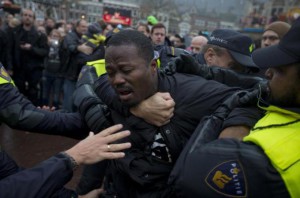
The pro-Piet Facebook page now has around 2 million ‘likes’. Geert Wilders offers himself once again as a standard-bearer for those who want to keep Black Pete, vowing to introduce a new law to preserve the status quo ante, to ‘ensure that Black Pete will stay black’. Those who challenge the tradition of blacking up are now mocked, humiliated, harassed, threatened with death, described mockingly in online debates as ‘unruly slaves’ told to ‘go back to their own countries’, or, if they are white mothers of black children, described as ‘N****r lovers’ and told to take their ‘Black Pete children’ elsewhere. According to Abulkasim Al Jaberi and Bryan van Hulst Miranda, what the Zwarte Piet affair has revealed so dramatically is the ‘existence of a hidden racial line that separates those who are imagined to belong to the nation-state, and therefore entitled to rights and benefits, and those who are not’.[26]
Related links
IRR News story: ‘Zwarte Piet’ and Dutch racism
IRR News story: Hatred, hysteria and a Trojan Horse
IRR News story: Islamophobia, loyalty and the treason debate
Read a Claystone report: Muslim charities: a suspect sector

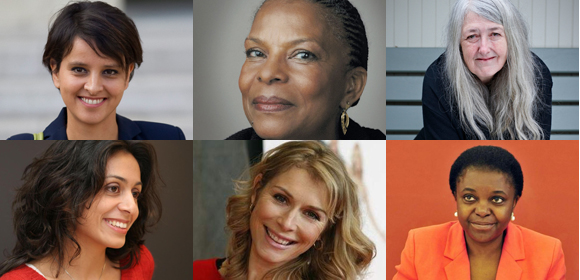
SALAAM,S
DEAR BROTHER,S AND SISTER,S IN ISLAM
THIS SHORT LIFE IS ONLY A TEST
THE BEST IS YET TO COME
PARADISE IS ETERNAL,THERE IS NO END
IT JUST GOES ON AND ON AND ON
STAY STRONG AND BELIEVE
RONNY MEAH [ABDUR RAHMAN)